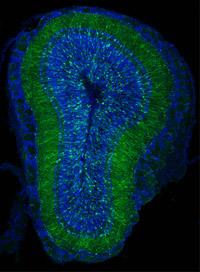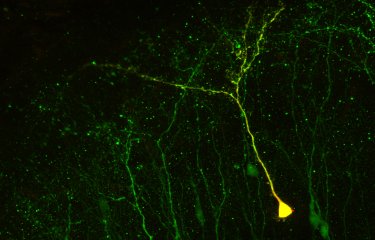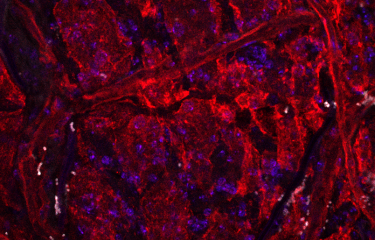Researchers at the Institut Pasteur and the CNRS have recently identified in mice the role played by neo-neurons formed in the adult brain. By using selective stimulation the researchers were able to show that these neo-neurons increase the ability to learn and memorize difficult cognitive tasks. This newly discovered characteristic of neo-neurons to assimilate complex information could open up new avenues in the treatment of some neurodegenerative diseases. This publication is available online on the Nature Neuroscience journal’s website.
Press release
Paris, may 14, 2012

Using mice models the team working under Pierre-Marie Lledo, head of the Laboratory for Perception and Memory (Institut Pasteur/CNRS) recently revealed the role of these neo-neurons formed in the adult brain with respect to learning and memory. With the help of an experimental approach using optogenetics*, developed by this very same team and published in December 2010, the researchers were able to show that when stimulated by a brief flash of light these neo-neurons facilitate both learning and the memorization of complex tasks. This resulted in mice models that were able to memorize information given during the learning activity more quickly and remember exercises even 50 days after experimentation had ended. The study also shows that neo-neurons generated just after birth hold no added advantages as relates to either learning or memory. In this respect it is only the neurons produced by the adult brain that have any considerable significance.
“This study shows that the activity of just a few neurons produced in the adult brain can still have considerable effects on cognitive processes and behavior. Moreover, this work helps to illustrate how the brain assimilates new stimulations seeing as normally electrical activity (which we mimic using flashes of light) is produced within the brain’s attention centers”, explains the study’s director Pierre-Marie Lledo.
Beyond simply discovering the functional contribution of these neo-neurons, the study has also reaffirmed the clear link between “mood” (defined here by a specific pattern of stimulation) and cerebral activity. It has been shown that curiosity, attentiveness and pleasure all promote the formation of neo-neurons and consequently the acquisition of new cognitive abilities. Conversely, a state of depression is detrimental to the production of new neurons and triggers a vicious cycle which prolongs this state of despondency. These results, and the optogenetics technologies that enabled this study, may prove very useful for devising therapeutic protocols which aim to counter the development of neurologic or psychiatric diseases.
Illustration – Copyright Institut Pasteur
Caption: Section of a mouse brain observed using a fluorescence microscope. The green filaments represent neo-neurons in an organized network.
Source
Activation of adult-born neurons facilitates learning and memory, published online on the Nature Neuroscience website, May 13, 2012
Mariana Alonso1, 2, Gabriel Lepousez1, 2, Sebastien Wagner1, 2, Cedric Bardy1, 2, Marie-Madeleine Gabellec1, 2, Nicolas Torquet1, 2 and Pierre-Marie Lledo1, 2
1 Institut Pasteur, Laboratory for Perception and Memory, F-75015 Paris, France.
2 Centre National de la Recherche Scientifique (CNRS), Unité de Recherche Associée (URA2182), F-75015 Paris, France.
Contacts
Institut Pasteur Press Office
Sabine D'Andrea / +33 (0)1 44 38 92 17
Nadine Peyrolo / +33 (0)1 45 68 81 47
presse@pasteur.fr




